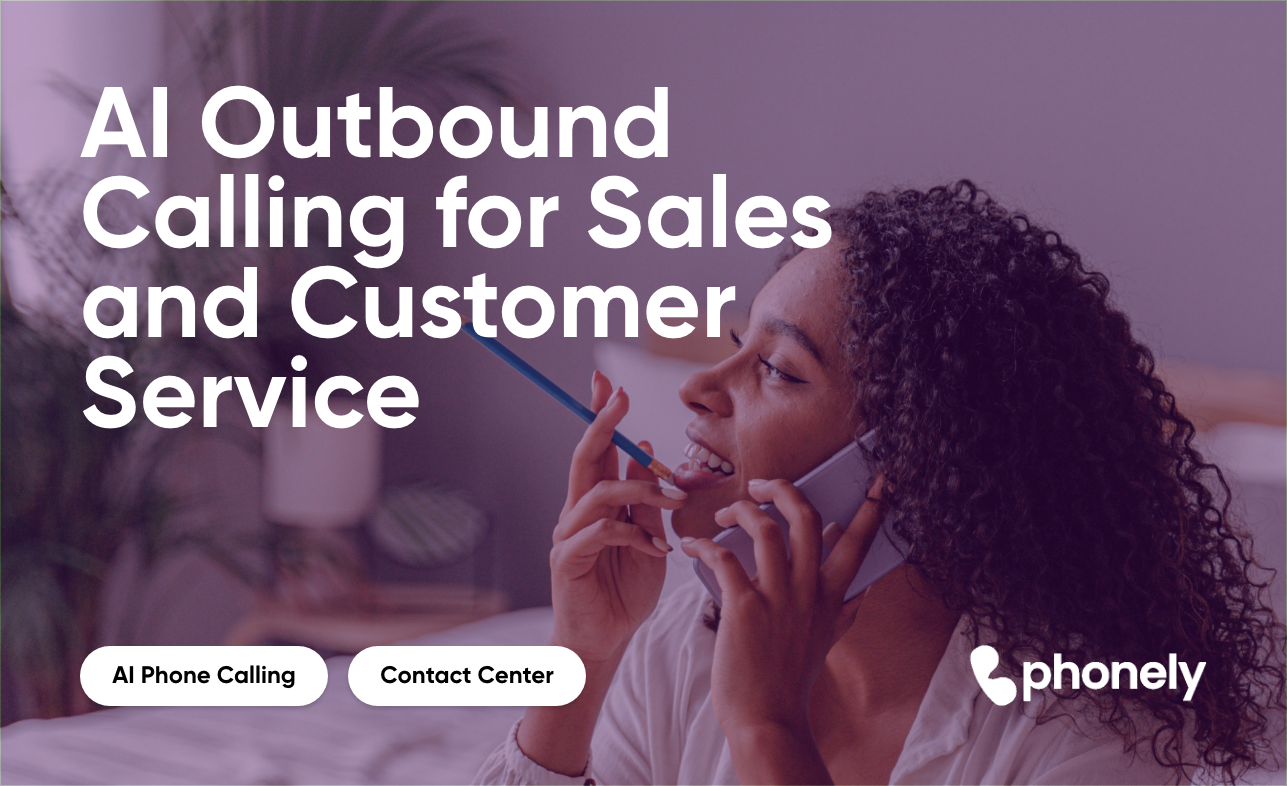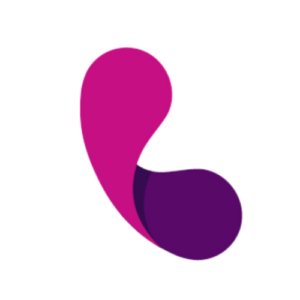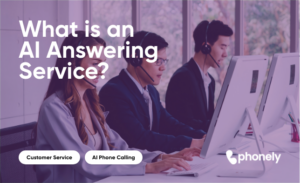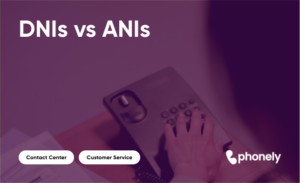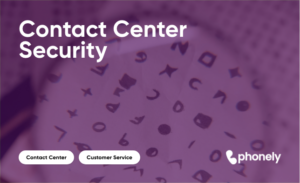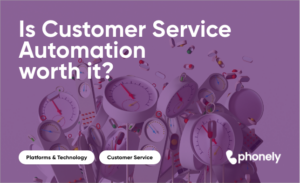AI-powered outbound calls have changed how businesses approach sales and customer service operations. Applications like data collection, lead qualification, appointment confirmation, and rescheduling, which earlier required humans to make outbound calls have now been automated without losing the personalized touch. This has primarily come about as a result of large language models getting better over time, and the latency times on AI calls hitting an all-time low.
What is AI Outbound Calling?
For the uninitiated, AI outbound calling means using artificial intelligence to automate outgoing phone calls, both the dialing and the conversation that takes place on each call. With voice AI, you can create AI agents who speak to customers on the phone for you. This can be done for various purposes, such as sales outreach, appointment reminders, or proactive customer service follow-ups.
Using API systems like Phonely integrates with your CRM system, and can access all customer data. Data can then be used to call customers and personalize interactions. Using workflows, these systems guide the caller through conversations to address any questions or concerns they may have. Unlike voice IVRs these workflows are not rigid, they support natural language input, making it possible to have a conversation. Lastly, using speech recognition, these systems can log call outcomes that include both the solution provided along with customer sentiment. These are especially useful when a human agent makes the flow-up call.
Most use cases of this technology involve the automation of routine interactions, allowing human agents to focus on more complex customer interactions.
Key Benefits
- Scalable: AI systems unlike human agents can make 1000s of calls at once. This makes it ideal for high-volume campaigns. From a time perspective, this is huge. Calling campaigns that would’ve previously taken days, can now be accomplished in a matter of hours.
- Cost-Effective: Not using human agents brings significant cost advantages. At Phonely we have seen AI agents to be 60% more cost effective when compared to human agents.
- Consistency: AI agents are also consistent. Tied to workflows AI agents know the series of questions that they need answered and the information they need to provide. So they are accurate all the time, every time. While human agents are prone to slip up, AI agents are not.
- 24/7 Availability: AI agents don’t need breaks or sleep. They are available 24/7 around the clock. Making them dependable for routine calling operations like customer service.
- Personalization: AI-powered virtual agents can be trained in a specific manner to handle customer interactions. This helps you personalize interactions without having a human talent in the mic.
Let’s see how this technology works in different industries to make customer interactions cost-effective and streamlined.
AI Outbound Calling in Sales
For sales teams, outbound calling is their bread and butter. Having successful interactions is cardinal to their success. Outbound AI takes some of the tedium out of this. While cold calling may not be the best application, engaging warm and converted leads is a great use case. Here are some of the top applications that we see our customers use this for:
Applications in Sales
- Lead Qualification: AI-powered outbound calls can pre-qualify leads by asking relevant questions and gauging caller interest before passing them to human agents. One of our clients uses Phonely to qualify healthcare and insurance leads based on age and financial capacity.
- Follow-ups: Several industries require customer follow-ups once the lead is received. We recently set up a workflow for one of our clients to call warm leads 15 seconds after they enter the pipeline. A response rate that is next to impossible with a human agent.
- Customer Onboarding: Onboarding customers onto a product or service can also be automated using Outbound calling. With a well-defined workflow, you can onboard clients onto your product or service without having a human being do so. The most common and simple application of this is new phone connections where activation steps are handled by an AI agent.
- Upselling and Cross-Selling: Using various trigger conditions inside a CRM, you ca automate outbound calls to customers who are ripe for an upgrade or a cross-sell. This allows you to maximize revenue from current customers. This may not be a high ticket conversion, but it can be explored with AI without taking away human agents from your core offering.
AI Outbound Calling in Healthcare
Healthcare happens to be one of the most challenging and complex industries. Here timely communications with patients and staff matters a lot. Most hospitals and physician practices find themselves understaffed and overwhelmed. That’s where AI-powered outbound calling shoulders some of the load.
Applications in Healthcare
- Appointment Scheduling and Reminders: One of the most common applications we see are appointment scheduling and reminders. We have seen clinics across the US and Australia use Phonely’s platform to take and follow up on appointments, freeing up the admin staff to manage other healthcare job functions like patient records and assist physicians.
- Medication Adherence: For aged patients, its often difficult to remember when they need to take their medication or when their prescription is due. Many of whom don’t have a caregiver. In these cases, AI agents can be used to trigger reminder calls, so they can take medication and get refills when necessary.
- Surveys: Surveys in the medical field can be a game-changer when it comes to improving service quality and providing access. This past month, we helped a health tech company run a 700 call outbound campaign to find out which clinics accept veterans at their practice. A campaign that had an engagement rate of over 30%.
- Billing and Payment Reminders: AI can also save medical billing teams a great deal of time when trying to collect outstanding invoices. AI agents can also collect insurance information from patients before appointments, saving time in the clinic. This makes is easier to bill patients and insurance companies, making healthcare revenue cycle management smoother. Customer input goes to the CRM right after the call, a CRM automation sends this to insurance and claims. Direct and simple!
AI Outbound Calling in Administrative Tasks
Phone-based administrative work is practically begging for an AI transformation at this point. Most admin tasks are repetitive and can easily be handled by an AI agent without any sophisticated setups. A simple line of questioning with the right CRM in place can often take off the administrative burdens from your staff. It’s up to your creativity to automate some of these tasks.
Applications in Administration
- Event Registration: Registering for events can be a breeze. People can RSVP for events without having to speak with a human agent. Automated calls can confirm event registrations and provide details like directions and even links via email and text.
- Internal Communications: Policy changes, meeting reminders, and registering for leaves can all be automated via AI calling. A major stationery retailer on our platform is using this to confirm leave requests from their employees.
- Data Collection: Simple and repetitive data collection can easily be automated with AI agents. Yes, IVRs can also do this, but with conversation AI built into this system, you can have multiple call outcomes all tagged in a context-specific manner.
AI Outbound Calling in Retail
In the world of retail, where omnichannel support across multiple platforms is prevalent, you already have a plethora of customer data available to you. This data can be used to make personalized outbound calls to customers, informing them of offers like loyalty points, membership expiration, and end-of-year sales. If you are in retail, chances are that you are already using an integrated multimodal communications stack to manage social media, email, and phone calls. With AI calling in the mix, you can automate several parts of these interactions. These include:
Applications in Retail
- Promotional Campaigns: AI agents can inform customers about special offers, discounts, or new product launches.
- Loyalty Program Engagement: Automated calls encourage participation in loyalty programs and highlight exclusive rewards.
- Order Updates: AI provides real-time updates on order statuses, including shipping and delivery notifications.
- Customer Feedback: Retailers can use AI to gather post-purchase feedback, helping refine their offerings.
AI Outbound Calling in Financial Services
Financial institutions primarily banking involve a large volume of clerical and administrative work. Inaccuracies here could be expensive, both for the institution and its customers. Having AI agents here ensures that records are accurately captured and stored. There’s also the benefit of availability. With 24×7 availability, conversational AI agents can take quick action in time-sensitive matters like flagging suspicious activity and taking immediate action. Some of the top applications include:
Applications in Financial Services
- Fraud Alerts: AI agents can be trained to send outbound calls each time your system detects fraudulent activity. They can then verify the transaction with the customer and take necessary action like locking a card or a bank account.
- Loan Follow-Up: Customers can be called to inform them of loan availability. You can also use these agents to provide updates on current applications and their status.
- Payment Reminders: You can help customers secure their financial health by proactively reminding them of their upcoming payments. Outbound communication can also be used to follow up on outstanding payments and debt collection. Another key use case that we have seen with Phonely.
- Customer Retention: Clients value quick service when it comes to routine tasks like checking balances, getting transaction details, and receiving OTPs. Based on customer preference and transaction type, you can send out AI calls to accomplish these.
Best Practices for Outbound Calling Using AI
For every outbound call placed with AI, there are some key practices to ensure that you provide a high level of customer satisfaction while keeping costs as low as possible. Here’s what you need to set up an outbound campaign:
- Clear Goals: For each campaign you run, you must have a clear goal of what you want to achieve. This could be increasing conversions, reducing no-shows, or simply providing information to customers. Yes, your AI agent can do more than just the first initial use case, but your primary objective should be clear. Everything else can follow suit.
- Data Accuracy: The data given to your AI agents should be structured, clean, and free of conflicts. This will ensure that the agent says and replies in a predictable way.
- Choose the Right Partner: Opt for AI solutions that integrate seamlessly with your existing CRM system. Additionally, the system has a robust LLM, that provides accurate responses with low latency. In a nutshell, try Phonely!
- Test and Refine: A/B test your AI agent scripts to see what works better. Which script are customers more receptive to. Once you get a few calls out, in Phonely, you can use the Simulation feature to test scripts against each other!
- Uphold Compliance: Always ensure that your AI tool adheres to industry regulations, such as GDPR, HIPAA, or TCPA, to maintain trust and avoid legal issues down the line.
Conclusion
AI outbound calling is more than just a trend—it’s a strategic investment that empowers businesses to scale their operations and deliver personalized customer interactions. By leveraging this technology, organizations across industries can improve efficiency, reduce costs, and ultimately drive greater customer satisfaction and loyalty.
As adoption continues to grow, the businesses that integrate AI outbound calling into their strategies today will be the ones leading their industries tomorrow.

